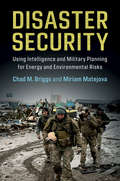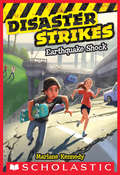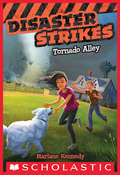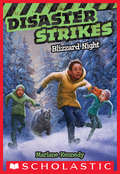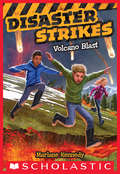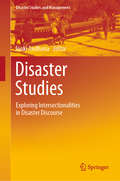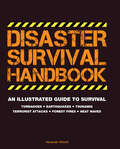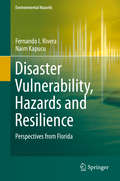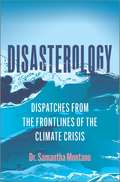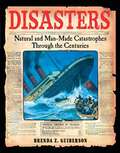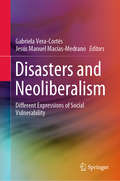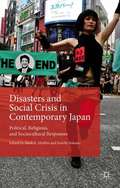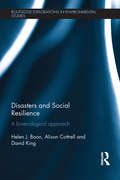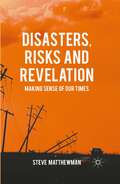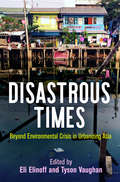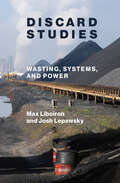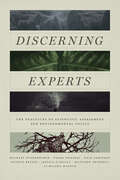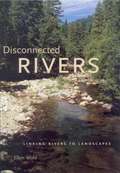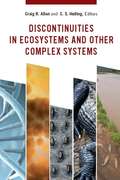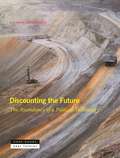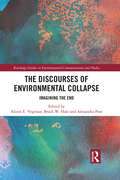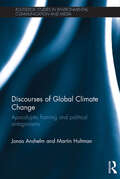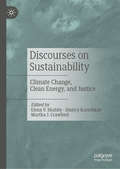- Table View
- List View
Disaster Security: Using Intelligence and Military Planning for Energy and Environmental Risks
by Chad M. Briggs Miriam MatejovaThis book is for a broad audience of practitioners, policymakers, scholars, and anyone interested in scenarios, simulations, and disaster planning. Readers are led through several different planning scenarios that have been developed over several years under the auspices of the US Department of Energy, the US Air Force, and continued work at GlobalInt LLC. These scenarios present different security challenges and their potential cascading impacts on global systems - from the melting of glaciers in the Andes, to hurricanes in New York and Hawaii, and on to hybrid disasters, cyberoperations and geoengineering. The book provides a concise and up-to-date overview of the 'lessons learned', with a focus on innovative solutions to the world's pressing energy and environmental security challenges.
Disaster Strikes #1: Earthquake Shock (Disaster Strikes #1)
by Marlane KennedyWhen disaster strikes, the only thing you can count on is yourself! It had seemed like the perfect California day. But as Joey Flores walked home from the skate park with his friends, the ground began to tremble, and Joey knew they were headed for trouble.... The earthquake that followed devastated their neighborhood, collapsing a nearby overpass with Joey and Fiona on one side and Kevin and Dylan on the other. Now Joey and his friends must rescue each other, endure the aftershocks, and find a new way home as the earth cracks beneath their feet.
Disaster Strikes #2: Tornado Alley (Disaster Strikes #2)
by Marlane KennedyWhen disaster strikes, the only thing you can count on is yourself! Wyatt Anderson isn't thrilled that his prissy cousin is visiting his family's Oklahoma ranch. But it turns out Wyatt has bigger problems to deal with when a pair of dueling tornadoes lock the prairie in their sights.... Wyatt, Alison, and neighbors Joshua and Jackson have nowhere to run. And when the old barn is battered by the tornadoes' ferocious winds, the animals that live inside are in danger. Will Wyatt and his friends risk their own lives to protect them?
Disaster Strikes #3: Blizzard Night (Disaster Strikes #3)
by Marlane KennedyWhen disaster strikes, the only thing you can count on is yourself! A winter trip in the remote Michigan wilderness seemed like the perfect way for Jayden to get to know his new foster family. Though he doesn't have much in common with siblings Maggie and Connor, he's hoping they'll get to like each other over snow mobile races and steaming mugs of cocoa. But when the snow really starts to come down, the family van crashes and the three kids must go out into the bleak, white storm to search for help. Soon the wind is howling and night is starting to fall. Jayden, Maggie, and Connor will have to think fast, find shelter, watch out for bears, and somehow stay warm if they don't want to end up frozen in their tracks....
Disaster Strikes #4: Volcano Blast (Disaster Strikes #4)
by Marlane KennedyWhen disaster strikes, the only thing you can count on is yourself! Noah and Emma Burton have traded the sand and surf of their Hawaiian home for a chilly stay in Alaska, and Noah isn't happy about it. His father may be a volcano expert, but why did they have to travel to the coldest, grayest place on earth when there are millions of volcanoes near Honolulu? Noah thinks he's in for the most boring vacation of his life. He couldn't have been more wrong! A day trip to a remote island turns deadly when a once-dormant volcano suddenly sputters to life in an eruption of epic proportions. Now Noah, Emma, and their new neighbor Alex must fight to survive rivers of molten lava and clouds of toxic ash if they want to make it off the island alive....
Disaster Studies: Exploring Intersectionalities in Disaster Discourse (Disaster Studies and Management)
by Janki AndhariaThis book covers several dimensions of disaster studies as an emerging discipline. It is the inaugural book in the series ‘Disaster Studies and Management’ and deals with questions such as “Is disaster management a field of practice, a profession, or simply a new area of study?” Exploring intersectionalities, the book also examines areas of research that could help enhance the discourse on disaster management from policy and practice perspectives, revisiting conventional event-centric approaches, which are the basis for most writings on the subject. Several case studies and comparative analyses reflect a critical reading of research and practice concerning disasters and their management. The book offers valuable insights into various subjects including the challenge of establishing inter- and multi-disciplinary teams within the academia involved in disaster studies, and sociological and anthropological readings of post-disaster memoryscapes. Each of the contributors has an enduring interest in disaster studies, thus enriching the book immensely. This book will be of interest to all the students and scholars of disaster studies and disaster management, as well as to practitioners and policymakers.
Disaster Survival Handbook: An Illustrated Guide to Survival
by Alexander StilwellA practical and illustrated guide to getting through all types of life-threatening situations.Are you ready for the big one, whether it’s an earthquake, a hurricane, or a monster snowstorm? Disaster Survival Handbook will help you prepare for the unexpected—from stocking up on provisions to hunkering down in a safe area to administering basic first aid. The power of nature means that disasters are inevitable and that surviving them is all about preparation. With this useful illustrated guide, you’ll be able to take the steps necessary to keep your family and loved ones safe in the face of danger. Each chapter includes true stories of people who found themselves in the middle of a precarious situation . . . and how they managed to survive.
Disaster Vulnerability, Hazards and Resilience
by Fernando I. Rivera Naim KapucuThis monograph provides valuable lessons in building disaster resilience for rural communities and beyond. With a focus on Florida, the authors present a comprehensive review of the current debates surrounding the study of resilience, from federal frameworks, state plans and local initiatives. They also review evaluation tools and feature first-hand accounts of county emergency managers as well as non-profit and community groups on key issues, including perspectives on vulnerable groups such as the elderly, children and farm workers. Readers will find insightful answers to such questions as: How can the concept of resilience be used as a framework to investigate the conditions that lead to stronger, more sustainable communities? What factors account for the variation across jurisdictions and geographic units in the ability to respond to and recover from a disaster? How does the recovery process impact the social, political and economic institutions of the stricken communities? How do communities, especially rural ones, collaborate with multiple stakeholders (local, regional, state, national) during the transition from recovery to resilience? Can the collaborative nature of disaster recovery help build resilient communities'. The primary audiences of this book are scholars in emergency and crisis management, planning and policy, disaster response and recovery, disaster sociology and environmental management and policy. This book can also be used as a textbook in graduate and advanced undergraduate programs / courses on disaster management, disaster studies, emergency and crisis management, environmental policy and management and public policy and administration.
Disasterology: Dispatches from the Frontlines of the Climate Crisis
by Samantha MontanoPart memoir, part expert analysis, Disasterology is a passionate and personal account of a country in crisis—one unprepared to deal with the disasters of today and those looming in our future.With temperatures rising and the risk of disasters growing, our world is increasingly vulnerable. Most people see disasters as freak, natural events that are unpredictable and unpreventable. But that simply isn&’t the case – disasters are avoidable, but when they do strike, there are strategic ways to manage the fallout.In Disasterology, Dr. Montano, a disaster researcher, brings readers with her on an eye-opening journey through some of our worst disasters, helping readers make sense of what really happened from a emergency management perspective. She explains why we aren&’t doing enough to prevent or prepare for disasters, the critical role of media, and how our approach to recovery was not designed to serve marginalized communities. Now that climate change is contributing to the disruption of ecosystems and worsening disasters, Dr. Montano offers a preview of what will happen to our communities if we don&’t take aggressive, immediate action. In a section devoted to the COVID-19 pandemic, what is thus far our generation&’s most deadly disaster, she casts light on the many decisions made behind closed doors that failed to protect the public.A deeply moving and timely narrative that draws on Dr. Montano's first-hand experience in emergency management, Disasterology is essential reading for anyone who wants to understand how our country handles disasters, and how we can better face them together.
Disasters: Natural and Man-Made Catastrophes Through the Centuries
by Brenda Z. GuibersonNatural and man-made disasters have the power to destroy thousands of lives very quickly. Both as they unfold and in the aftermath, these forces of nature astonish the rest of the world with their incredible devastation and magnitude. In this collection of ten well-known catastrophes such as the great Chicago fire, the sinking of the Titanic, and hurricane Katrina, Brenda Guiberson explores the causes and effects, as well as the local and global reverberations of these calamitous events. Highlighted with photographs and drawings, each compelling account tells the story of destruction and devastation, and most especially, the power of mankind to persevere in the face of adversity.
Disasters
by Sean PriceThis book explains disasters to young children and puts them into a perspective where the children can understand them.
Disasters and Neoliberalism: Different Expressions of Social Vulnerability
by Gabriela Vera-Cortés Jesús Manuel Macías-MedranoThis book shows how the adoption of the neoliberal development model has increased the social vulnerability to disasters, with a special focus on Mexico, a country which once was the role model of the neoliberal turn in Latin America. It brings together 12 case studies of disasters such as floods, earthquakes and volcanic emergencies, in both urban and rural areas, to show how neoliberal development projects and changes in legislation affected disaster prevention and management in different parts of the country. The case studies from Mexico are complemented by two comparative studies which analyze the impacts of neoliberalism in disaster prevention and management in Mexico, Brazil, United States and Italy. Disasters and Neoliberalism: Different Expressions of Social Vulnerability presents a unique contribution to the interdisciplinary field of disaster research by presenting qualitative studies of disaster vulnerability from the perspective of scholars from the Global South, bringing a fresh and critical approach to English speaking social sciences qualitative researchers working on disaster risks in a number of fields, such as geography, anthropology, sociology, political science and environmental studies.
Disasters and Social Crisis in Contemporary Japan: Political, Religious, And Sociocultural Responses
by Koichi Nakano Mark MullinsJapan was shaken by the 'double disaster' of earthquake and sarin gas attack in 1995, and in 2011 it was hit once again by the 'triple disaster' of earthquake, tsunami, and nuclear meltdown. This international, multi-disciplinary group of scholars examines the state and societal responses to the disasters and social crisis.
Disasters and Social Resilience: A bioecological approach (Routledge Explorations in Environmental Studies)
by David King Helen J. Boon Alison CottrellThe interconnectedness of communities, organisations, governing bodies, policy and individuals in the field of disaster studies has never been accurately examined or comprehensively modelled. This kind of study is vital for planning policy and emergency responses and assessing individual and community vulnerability, resilience and sustainability as well as mitigation and adaptation to climate change impacts; it therefore deserves attention. Disasters and Social Resilience fills this gap by introducing to the field of disaster studies a fresh methodology and a model for examining and measuring impacts and responses to disasters. Urie Bronfenbrenner’s bioecological systems theory, which is used to look at communities holistically, is outlined and illustrated through a series of chapters, guiding the reader from the theory's underpinnings through research illustrations and applications focused on each level of Bronfenbrenner’s ecosystems, culminating in an integration chapter. The final chapter provides policy recommendations for local and national government bodies and emergency providers to help individuals and communities prepare and withstand the effects of a range of disasters. This book will be of great interest to scholars and students of disaster and emergency management, disaster readiness and risk reduction (DRR), and to scholars and students of more general climate change and sustainability studies.
Disasters, Risks and Revelation: Making Sense of Our Times
by Steve MatthewmanDisasters are part of the modern condition, a source of physical anxiety and existential angst, and they are increasing in frequency, cost and severity. Drawing on both disaster research and social theory, this book offers a critical examination of their causes, consequences and future avoidance.
Disastrous Times: Beyond Environmental Crisis in Urbanizing Asia (Critical Studies in Risk and Disaster)
by Eli Elinoff and Tyson VaughanAcross contemporary Asia, each day dawns with a new story about living in an era of profound environmental change. Rapid transformations in the landscape, society, and technology produce new conflicts that are experienced at nearly every scale of life in the region. Environmental change is marked in square kilometers or micrometers, in cities or in households, within national boundaries and beyond. These changes appear in the form of radical ruptures wrought both by spectacular catastrophes like massive floods or tsunamis and by slow tragedies like the widening epidemic of asthma or the grinding processes of land dispossession. Each of these scales and phenomena reveals what it is to live in disastrous times.This book explores how people across Asia live through and make sense of the environmental ruptures that now shape the region and asks how we might analyze this moment of disruption and risk. Global environmental shifts such as climate change are usually linked to large-scale practices such as industrialization, urbanization, and global capitalism. Here, in contrast, contributors illustrate how understanding the practical, political, and ethical consequences of living in a moment of planetary change—or intervening in its course—requires engaging with the human-scale actions and specific policies that both shape and respond to such transformations at an everyday level. Coastal residents of routinely flooded Semarang, eco-conscious retirees in a Chinese suburb, and cyclists navigating air pollution in Kolkata each experience environmental risk and change in highly situated and specific ways; yet attending to their lived, quotidian experiences enables us to apprehend the complex processes that are profoundly changing the planet.Contributors: Nikolaj Blichfeldt, Vivian Choi, Eli Elinoff, Jenny Elaine Goldstein, Andrew Alan Johnson, Samuel Kay, Lukas Ley, Edmund Joo Vin Oh, Malini Sur, Tyson Vaughan.
Discard Studies: Wasting, Systems, and Power
by Max Liboiron Josh LepawskyAn argument that social, political, and economic systems maintain power by discarding certain people, places, and things.Discard studies is an emerging field that looks at waste and wasting broadly construed. Rather than focusing on waste and trash as the primary objects of study, discard studies looks at wider systems of waste and wasting to explore how some materials, practices, regions, and people are valued or devalued, becoming dominant or disposable. In this book, Max Liboiron and Josh Lepawsky argue that social, political, and economic systems maintain power by discarding certain people, places, and things. They show how the theories and methods of discard studies can be applied in a variety of cases, many of which do not involve waste, trash, or pollution. Liboiron and Lepawsky consider the partiality of knowledge and offer a theory of scale, exploring the myth that most waste is municipal solid waste produced by consumers; discuss peripheries, centers, and power, using content moderation as an example of how dominant systems find ways to discard; and use theories of difference to show that universalism, stereotypes, and inclusion all have politics of discard and even purification—as exemplified in &“inclusive&” efforts to broaden the Black Lives Matter movement. Finally, they develop a theory of change by considering &“wasting well,&” outlining techniques, methods, and propositions for a justice-oriented discard studies that keeps power in view.
Discerning Experts: The Practices of Scientific Assessment for Environmental Policy
by Milena Wazeck Naomi Oreskes Dale Jamieson Michael Oppenheimer Keynyn Brysse Jessica O’Reilly Matthew ShindellDiscerning Experts assesses the assessments that many governments rely on to help guide environmental policy and action. Through their close look at environmental assessments involving acid rain, ozone depletion, and sea level rise, the authors explore how experts deliberate and decide on the scientific facts about problems like climate change. They also seek to understand how the scientists involved make the judgments they do, how the organization and management of assessment activities affects those judgments, and how expertise is identified and constructed. Discerning Experts uncovers factors that can generate systematic bias and error, and recommends how the process can be improved. As the first study of the internal workings of large environmental assessments, this book reveals their strengths and weaknesses, and explains what assessments can—and cannot—be expected to contribute to public policy and the common good.
Disconnected Rivers: Linking Rivers to Landscapes
by Ellen E. WohlThis important and accessible book surveys the history and present condition of river systems across the United States, showing how human activities have impoverished our rivers and impaired the connections between river worlds and other ecosystems. Ellen Wohl begins by introducing the basic physical, chemical, and biological processes operating in rivers. She then addresses changes in rivers resulting from settlement and expansion, describes the growth of federal involvement in managing rivers, and examines the recent efforts to rehabilitate and conserve river ecosystems. In each chapter she focuses on a specific regional case study and describes what happens to a particular river organism--a bird, North America's largest salamander, the paddlefish, and the American alligator--when people interfere with natural processes.
Discontinuities in Ecosystems and Other Complex Systems (Complexity in Ecological Systems)
by Craig R. Allen C. S. Holling Eds.Following the publication of C. S. Holling's seminal work on the relationship between animal body mass patterns and scale-specific landscape structure, ecologists began to explore the theoretical and applied consequences of discontinuities in ecosystems and other complex systems. Are ecosystems and their components continuously distributed and do they adhere to scaling laws, or are they discontinuous and more complex than early models would have us believe? The resulting propositions over the structure of complex systems sparked an ongoing debate regarding the mechanisms generating discontinuities and the statistical methods used for their detection.This volume takes the view that ecosystems and other complex systems are inherently discontinuous and that such fields as ecology, economics, and urban studies greatly benefit from this paradigm shift. Contributors present evidence of the ubiquity of discontinuous distributions in ecological and social systems and how their analysis provides insight into complex phenomena. The book is divided into three sections. The first focuses on background material and contrasting views concerning the discontinuous organization of complex systems. The second discusses discontinuous patterns detected in a number of different systems and methods for detecting them, and the third touches on the potential significance of discontinuities in complex systems. Science is still dominated by a focus on power laws, but the contributors to this volume are convinced power laws often mask the interesting dynamics of systems and that those dynamics are best revealed by investigating deviations from assumed power law distributions.In 2008, a grand conference on resilience was held in Stockholm, hosting 600 participants from around the world. There are now three big centers established with resilience, the most recent one being the Stockholm Resilience Center, with others in Australia (an international coral reef center), Arizona State University's new sustainability center focusing on anthropology, and Canada's emerging social sciences and resilience center. Activity continues to flourish in Alaska, South Africa, and the Untied Kingdom, and a new center is forming in Uruguay.
Discontinuities in Ecosystems and Other Complex Systems
by C. S. Holling Craig R. AllenA Major Contribution to Theoretical Ecology
Discounting the Future: The Ascendancy of a Political Technology
by Liliana DoganovaA pioneering exploration of the defining traits and contradictions of our relationship to the future through the lens of discountingForest fires, droughts, and rising sea levels beg a nagging question: have we lost our capacity to act on the future? Liliana Doganova&’s book sheds new light on this anxious query. It argues that our relationship to the future has been trapped in the gears of a device called discounting. While its incidence remains little known, discounting has long been entrenched in market and policy practices, shaping the ways firms and governments look to the future and make decisions accordingly. Thus, a sociological account of discounting formulas has become urgent.Discounting means valuing things through the flows of costs and benefits that they are likely to generate in the future, with these future flows being literally dis-counted as they are translated in the present. How have we come to think of the future, and of valuation, in such terms? Building on original empirical research in the historical sociology of discounting, Doganova takes us to some of the sites and moments in which discounting took shape and gained momentum: valuation of European forests in the eighteenth and nineteenth centuries; economic theories devised in the early 1900s; debates over business strategies in the postwar era; investor-state disputes over the nationalization of natural resources; and drug development in the biopharmaceutical industry today. Weaving these threads together, the book pleads for an understanding of discounting as a political technology, and of the future as a contested domain.
The Discourses of Environmental Collapse: Imagining the End (Routledge Studies in Environmental Communication and Media)
by Alison E. Vogelaar Brack W. Hale Alexandra PeatIn recent years, ‘environmental collapse’ has become an important way of framing and imagining environmental change and destruction, referencing issues such as climate change, species extinction and deteriorating ecosystems. Given its pervasiveness across disciplines and spheres, this edited volume articulates environmental collapse as a discursive phenomenon worthy of sustained critical attention. Building upon contemporary conversations in the fields of archaeology and the natural sciences, this volume coalesces, explores and critically evaluates the diverse array of literatures and imaginaries that constitute environmental collapse. The volume is divided into three sections— Doc- Collapse, Pop Collapse and Craft Collapse —that independently explore distinct modes of representing, and implicit attitudes toward, environmental collapse from the lenses of diverse fields of study including climate science and policy, cinema and photo journalism. Bringing together a broad range of topics and authors, this volume will be of great interest to scholars of environmental communication and environmental humanities.
Discourses of Global Climate Change: Apocalyptic framing and political antagonisms (Routledge Studies in Environmental Communication and Media)
by Martin Hultman Jonas AnshelmThis book examines the arguments made by political actors in the creation of antagonistic discourses on climate change. Using in-depth empirical research from Sweden, a country considered by the international political community to be a frontrunner in tackling climate change, it draws out lessons that contribute to the worldwide environmental debate. The book identifies and analyses four globally circulated discourses that call for very different action to be taken to achieve sustainability: Industrial fatalism, Green Keynesianism, Eco-socialism and Climate scepticism. Drawing on risk society and post-political theory, it elaborates concepts such as industrial modern masculinity and ecomodern utopia, exploring how it is possible to reconcile apocalyptic framing to the dominant discourse of political conservatism. This highly original and detailed study focuses on opinion leaders and the way discourses are framed in the climate change debate, making it valuable reading for students and scholars of environmental communication and media, global environmental policy, energy research and sustainability.
Discourses on Sustainability: Climate Change, Clean Energy, and Justice
by Elena V. Shabliy Dmitry Kurochkin Martha J. CrawfordThis volume presents an in-depth analysis of climate change problems and discusses the proliferation of renewable energy worldwide—in conjunction with such important questions as social justice and economic growth, providing an interdisciplinary approach to sustainable development. Exploring various responses to human-induced climate change, the book offers a critical reflection on climate change and clean energy and highlights the fundamental problems of international energy justice and human rights. Examining these and other climate-related issues from legal, business, political, and scientific perspectives, the volume also analyzes the impact of economic factors and policies on climate change mitigation and adaptation.
